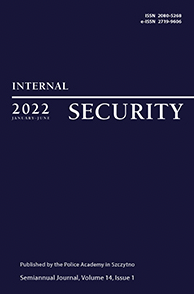Predictors of Secondary Traumatic Stress Symptoms in Police Officers Exposed to Secondary Trauma
Predictors of Secondary Traumatic Stress Symptoms in Police Officers Exposed to Secondary Trauma
Author(s): Nina Ogińska-Bulik, Grzegorz BąkSubject(s): Public Administration, Public Law
Published by: Akademia Policji w Szczytnie
Keywords: personality; police; predictors; secondary traumatic stress; self-efficacy; rumination
Summary/Abstract: Police officers are particularly exposed to work-related stress and one of the difficult situations they face is contact with trauma victims. Such exposure may entail a range of negative consequences for helpers, such as symptoms of secondary traumatic stress (STS) and risk of secondary traumatic stress disorder (STSD). The aim of this study is to establish the predictors of STS symptoms among police officers who have been exposed to secondary trauma in the line of duty. The following factors have been assessed as potential predictors: personality traits, rumination on their experiences, and a sense of self-efficacy in coping with trauma experienced by others. The research was carried out from June to October 2021 at the Police Academy in Szczytno, Poland, among participants of training and professional courses for police officers. Out of 790 surveyed officers, the results of 682 officers who reported direct contact with trauma victims were taken into account. Four standard measurement tools, i.e. the Secondary Traumatic Stress Inventory, The NEO Five-Factor Inventory, The Event Related Rumination Inventory, The Secondary Trauma Self-Efficacy Scale, were used, along with a survey developed for the purpose of the study. The participants demonstrated a relatively low risk of experiencing negative consequences of exposure to secondary trauma: a low risk of developing STSD was observed for 86.1% of the participants and a high risk was observed for 13.9%. The symptoms of STS were positively correlated with ruminations on the traumatic events experienced by clients, especially intrusive ones. Intrusive ruminations turned out to be the main predictor of STS. With regard to personality traits, STS was most closely associated with neuroticism. A sense of self-efficacy was negatively correlated with symptoms of STS. Although the study on police officers working with trauma victims showed rather low intensity of STS symptoms, it is advisable to expand their the competencies in coping with trauma, including reducing the tendency to ruminate on the traumatic events experienced by client.
Journal: Internal Security
- Issue Year: 14/2022
- Issue No: 1
- Page Range: 205-223
- Page Count: 19
- Language: English

